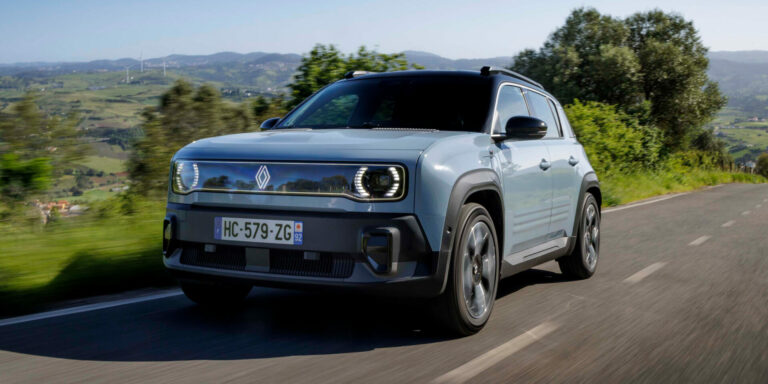Renault Announces Pricing for New 4 E-Tech Electric Crossover
Renault has revealed the UK pricing for its new 4 E-Tech crossover, which will be available to order from the start of July 2025. The electric vehicle is the second model from Renault to draw inspiration from its historical lineup, following the retro styling cues of the original Renault 4 from the 1960s.

While the new 4 E-Tech retains the boxy appearance and practicality of its predecessor, it is powered entirely by electricity. The model will be available in three trim levels: Evolution, Techno, and Iconic, with prices starting from approximately £27,000.
The design incorporates several retro elements, including bonnet lines that extend to the bottom of the grille, rear quarter windows, and sculpted door lines that echo the original’s plastic protectors. A distinctive feature available on higher trims is an electric canvas roof, reminiscent of the original 1960s model.
The Renault 4 E-Tech is larger than the Renault 5, offering increased interior space. Rear passengers benefit from additional knee room, while headroom is particularly generous for this vehicle class. The boot capacity is 420 litres with the rear seats in place and expands to 1,405 litres when folded, complemented by a 55-litre underfloor storage area. The top-spec Iconic model features a powered tailgate.
Standard equipment across the range is competitive, with the base Evolution model featuring 18-inch diamond-cut alloy wheels, automatic high-beam headlights, keyless entry, and dual-zone climate control. All models come with a ten-inch central touchscreen supporting wireless Android Auto and Apple CarPlay, cruise control, rear parking sensors, a rear-view camera, and various accident-avoidance safety systems.
Pricing is structured as follows:
- Evolution: from £27,000
- Techno: from £29,000
- Iconic: from £31,000
All variants are equipped with a 150hp electric motor powered by a 52kWh battery, offering a driving range of up to 247 miles. A rapid charge from 15% to 80% takes approximately 30 minutes, while a full charge from 0-100% at home requires less than eight hours.



